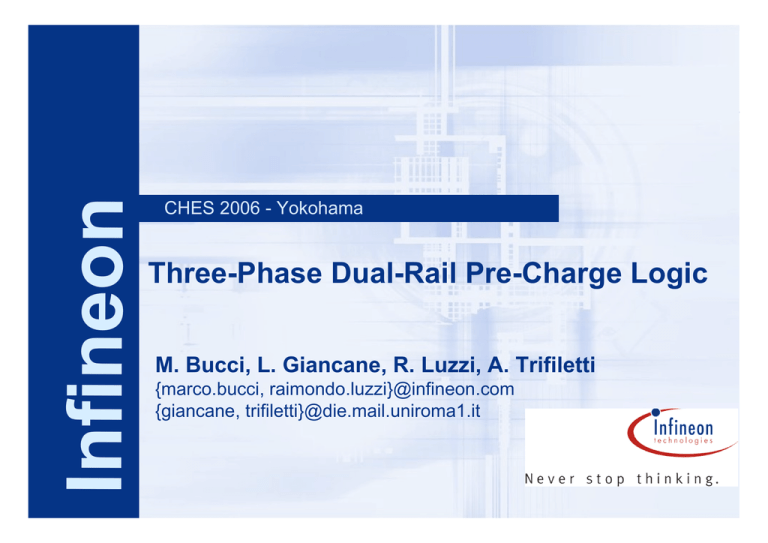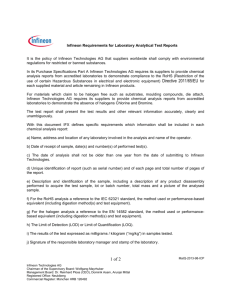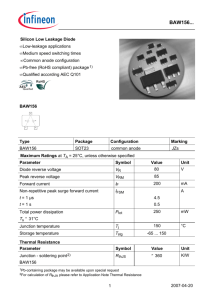
Infineon
M. Bucci,
IFDA DCGR CC
Page 1
CHES 2006 - Yokohama
Three-Phase Dual-Rail Pre-Charge Logic
M. Bucci, L. Giancane, R. Luzzi, A. Trifiletti
{marco.bucci, raimondo.luzzi}@infineon.com
{giancane, trifiletti}@die.mail.uniroma1.it
Copyright © Infineon Technologies 2005. All rights reserved.
Summary
! Advantages of pre-charged dual-rail logics
! Some implementation issues
! Impact of unbalanced loads and circuit asymmetries on the
actual robustness against DPA
! The proposed logic style (TDPL) vs a reference dual-rail
logic style (SABL)
! Simulation testbench and results on basic gates
! Case study: FULLADDER
M. Bucci,
IFDA DCGR CC
Page 2
Copyright © Infineon Technologies 2005. All rights reserved.
Application scenario: masking a state machine
Busses and registers can be “easily” XOR-masked.
Unfortunately, this does not hold for combinatorial functions that, in
general, are not linear with the XOR operator.
F(x, s)
REG
clk
XOR(s’, m’)
XOR(sm, m)
x
Dual-Rail pre-charged logic is a countermeasure suitable to be
“transparently” applied to combinatorial functions.
It has also the advantage to be “glitch-free”.
M. Bucci,
IFDA DCGR CC
Page 3
Copyright © Infineon Technologies 2005. All rights reserved.
Just two gates are needed for the implementation of a
complete dual-rail family
Basic gates
AND
XOR
NAND
XNOR
OR
NOR
M. Bucci,
IFDA DCGR CC
Page 4
NOT
Using a dynamic logic, gates are cascoded in
Domino style.
Therefore, different fanouts can be simply
obtained by using a suitable pair of static inverters
Copyright © Infineon Technologies 2005. All rights reserved.
Load capacitances in a dual-rail gate
The actual robustness of a dual-rail device depends on the actual
balancing of its implementation.
Load capacitance are the
main issue, but also internal
nodes are relevant.
In facts, an accurate load balancing requires a full custom design
flow (i.e. manual or semi-manual routing and a large amount of
post-layout simulations).
M. Bucci,
IFDA DCGR CC
Page 5
Copyright © Infineon Technologies 2005. All rights reserved.
Effect of unbalancing of complementary wires
d(t) = X1 (t) " X 0 (t)
X 0 (t)
X1(t)
d(t)
"X0!
!
!
!
" X1
!
!
A DPA peak appears when a set X of traces is partitioned on two
sets X0 and X1 in such a way their averages can be “distinguished”.
M. Bucci,
IFDA DCGR CC
Page 6
Copyright © Infineon Technologies 2005. All rights reserved.
Effect of unbalancing of complementary wires (cont.)
d
"d
where
!
is, in facts, the “signal/noise” ratio of a DPA peak
2
d
" ="
2
X0
+"
2
X1
and
"Xi =
"Xi
Ni
What does it mean?
As an example: a 5% unbalanced dual-rail will feature only a 1/20
attenuation
and could be attacked, using 400*N traces, the same
!
as a single rail using N traces.
!
...and 5% is a quite optimistic unbalancing estimation.
M. Bucci,
IFDA DCGR CC
Page 7
Copyright © Infineon Technologies 2005. All rights reserved.
How can we make the energy consumption of the
circuit “balanced”?
Normally, both rails are pre-charged, but only one is discharged
during the evaluation phase.
z
0
z
!
!
!
!
M. Bucci,
IFDA DCGR CC
Page 8
The problem comes from the fact that
the energy consumption depends on
which wire (or internal node) switches.
z
1
z
evaluation
pre-charge
Copyright © Infineon Technologies 2005. All rights reserved.
Three-phase dual-rail
In order to balance energy consumption we can simply make both
the wires switch by adding a discharge phase.
z
0
z
!
z
!
z
!
M. Bucci,
IFDA DCGR CC
Page 9
!
evaluation
As a matter of fact, we can notice that
now the information is not anymore on
which wire switches, but on when wire
switches (i.e. we use a sort of phaseencoding).
1
pre-charge
discharge
Copyright © Infineon Technologies 2005. All rights reserved.
The proposed logic style (inverter)
1.
2.
3.
M. Bucci,
IFDA DCGR CC
Page 10
charge: outputs are pre-charged to VDD via P1, P2, P5;
evaluation: N7 is closed thus discharging one of the outputs via the pull down
circuit (N5, N6) according on the input lines;
discharge: the additional pull down N1, N3, discharges the output line that was
not discharged during the evaluation phase.
Copyright © Infineon Technologies 2005. All rights reserved.
SABL vs TDPL
SABL inverter
TDPL inverter
In TDPL, two additional pull-downs NMOS (N1, N4) and a PMOS
switch (P1) are added in order to implement the discharge phase.
M. Bucci,
IFDA DCGR CC
Page 11
Copyright © Infineon Technologies 2005. All rights reserved.
Other gates in TDPL
As in SABL, gates differ only in the pull-down circuit.
AND
M. Bucci,
IFDA DCGR CC
Page 12
XOR
Notice that, being a dual-rail logic, the AND gate is actually a
“universal gate” (AND, NAND, OR, NOR).
Copyright © Infineon Technologies 2005. All rights reserved.
Simulation testbench (TDPL vs SABL)
• Process: Infineon 0.12!m, 1.5V supply voltage;
• Transistor sizes: W = 0.68!m; L = 0.12!m;
• Simulation: Spectre/BSIM3v3.
Since power consumption mainly depends on transitions, all
possible input transitions have been simulated.
M. Bucci,
IFDA DCGR CC
Page 13
Copyright © Infineon Technologies 2005. All rights reserved.
NAND current traces for all input transitions:
SABL vs TDPL
non constant
+
constant
+
M. Bucci,
IFDA DCGR CC
Page 14
Copyright © Infineon Technologies 2005. All rights reserved.
Simulation results for the three basic gates
NED =
!
M. Bucci,
IFDA DCGR CC
Page 15
max(E) " min(E)
max(E)
"E
NSD =
E
!
Copyright © Infineon Technologies 2005. All rights reserved.
Case study: TDPL vs SABL Full Adder
Dual-rail FULLADDER based on XOR and NAND gates cascaded
using a Domino logic (static inverters).
Notice that, in TDPL, static inverters do not cause unbalanced
energy consumption since, as the connection wires, each inverter
switches the same number of times.
M. Bucci,
IFDA DCGR CC
Page 16
Copyright © Infineon Technologies 2005. All rights reserved.
FULLADDER current traces: SABL vs TDPL
M. Bucci,
IFDA DCGR CC
Page 17
Copyright © Infineon Technologies 2005. All rights reserved.
Simulation results for the FULLADDER
• (8x8) traces related to all possible input transitions
• each gate is unbalanced as shown in the previous testbench
• NSD improvement over 25 times
• power consumption increasing about 50%
M. Bucci,
IFDA DCGR CC
Page 18
Copyright © Infineon Technologies 2005. All rights reserved.
Balanced vs unbalanced TDPL
Balanced and unbalanced TDPL behave almost the same: i.e. the
goal to avoid full-custom layout seems to be achieved!
M. Bucci,
IFDA DCGR CC
Page 19
C BALANCED
[pQ]
C UNBALANCED
10%
[pQ]
0,1761
0,1761
0,1764
0,1764
0,1761
0,1761
0,1764
0,1764
0,1764
0,1764
0,1761
0,1761
0,1764
0,1764
0,1761
0,1761
0,1836
0,1836
0,1839
0,1839
0,1836
0,1836
0,1839
0,1839
0,1839
0,1839
0,1836
0,1836
0,1839
0,1839
0,1836
0,1836
C BALANCED C UNBALANCED
10%
MAX
MIN
AED
NED
SD
NSD
0,1764
0,1761
0,0003
0,002
0,000
0,001
0,1839
0,1836
0,0003
0,002
0,000
0,001
The residual leakage seems to depend on second order effects such as:
- parasitics which depend on the state of adiacent nodes;
- power transfer through inputs;
- ...
Copyright © Infineon Technologies 2005. All rights reserved.
Conclusions
! DPA-resistant dual-rail logic family suitable for a semicustom design flow
! almost constant energy consumption even in presence of
heavily asymmetric interconnections and pull-downs:
– about 25 times more balanced than SABL in case of a
FULLADDER;
–
in facts, the same robustness as a full-custom dual-rail logic
! power consumption and area penalties smaller than MDPL
M. Bucci,
IFDA DCGR CC
Page 20
Copyright © Infineon Technologies 2005. All rights reserved.
Questions?
M. Bucci,
IFDA DCGR CC
Page 21
Copyright © Infineon Technologies 2005. All rights reserved.





